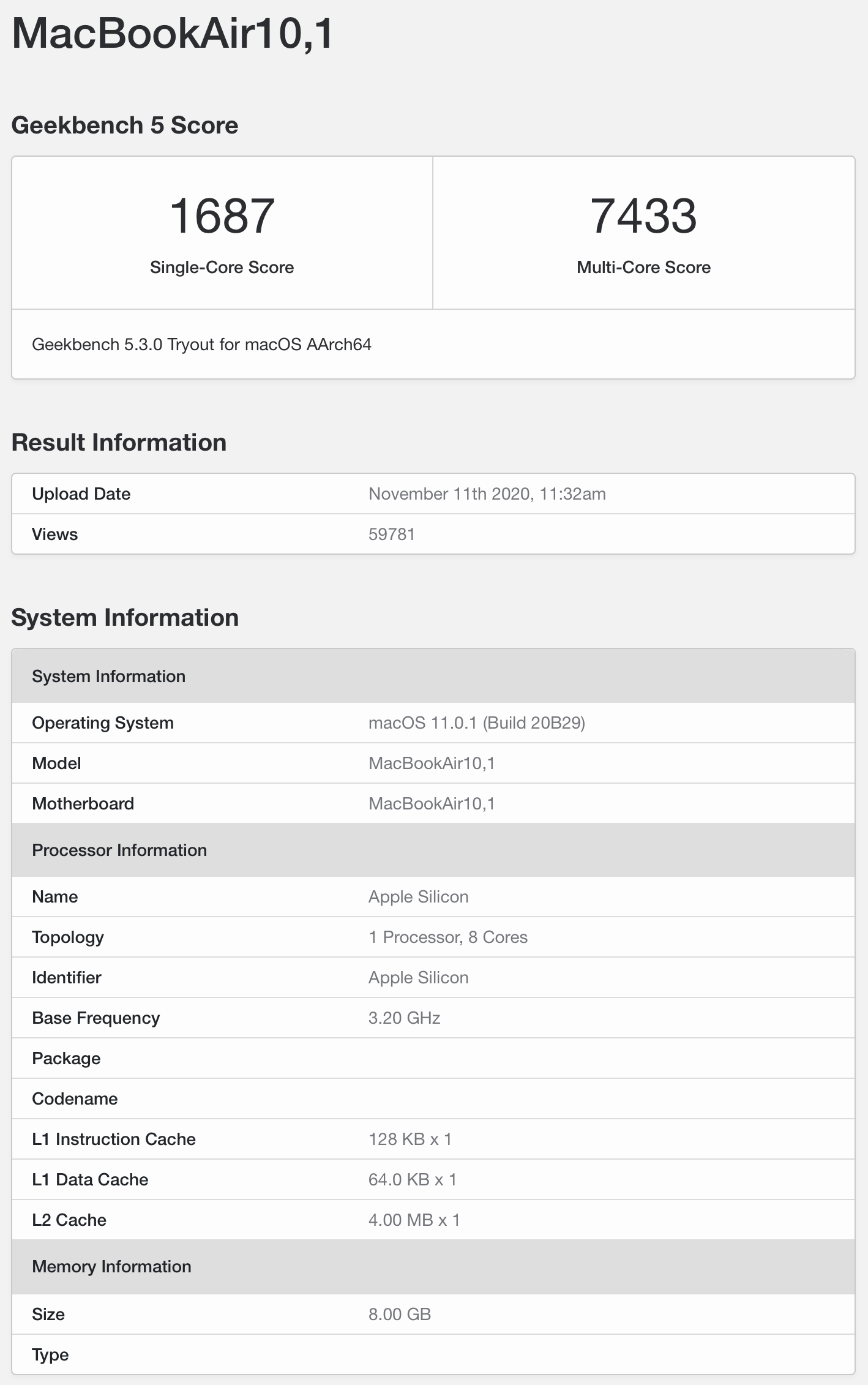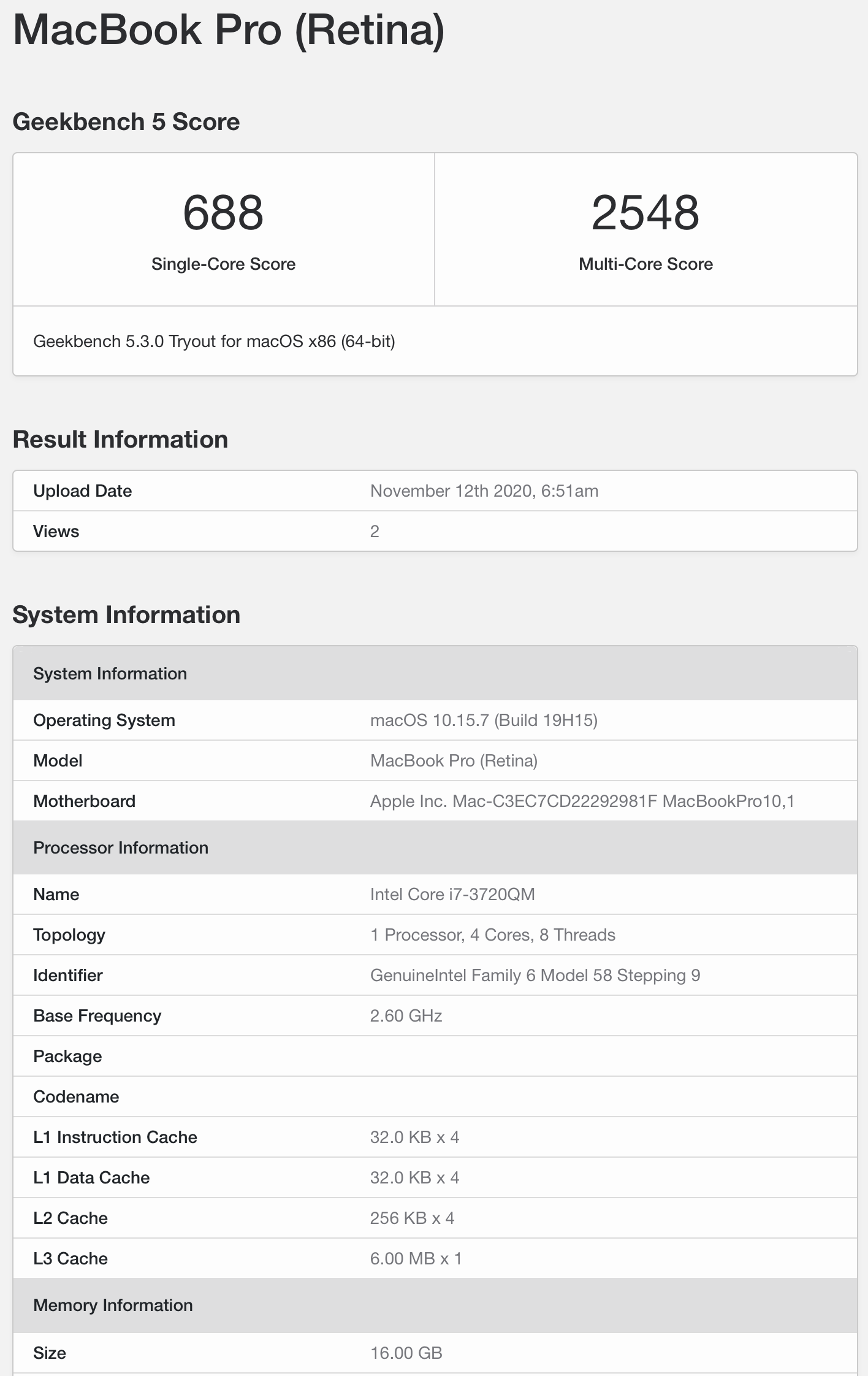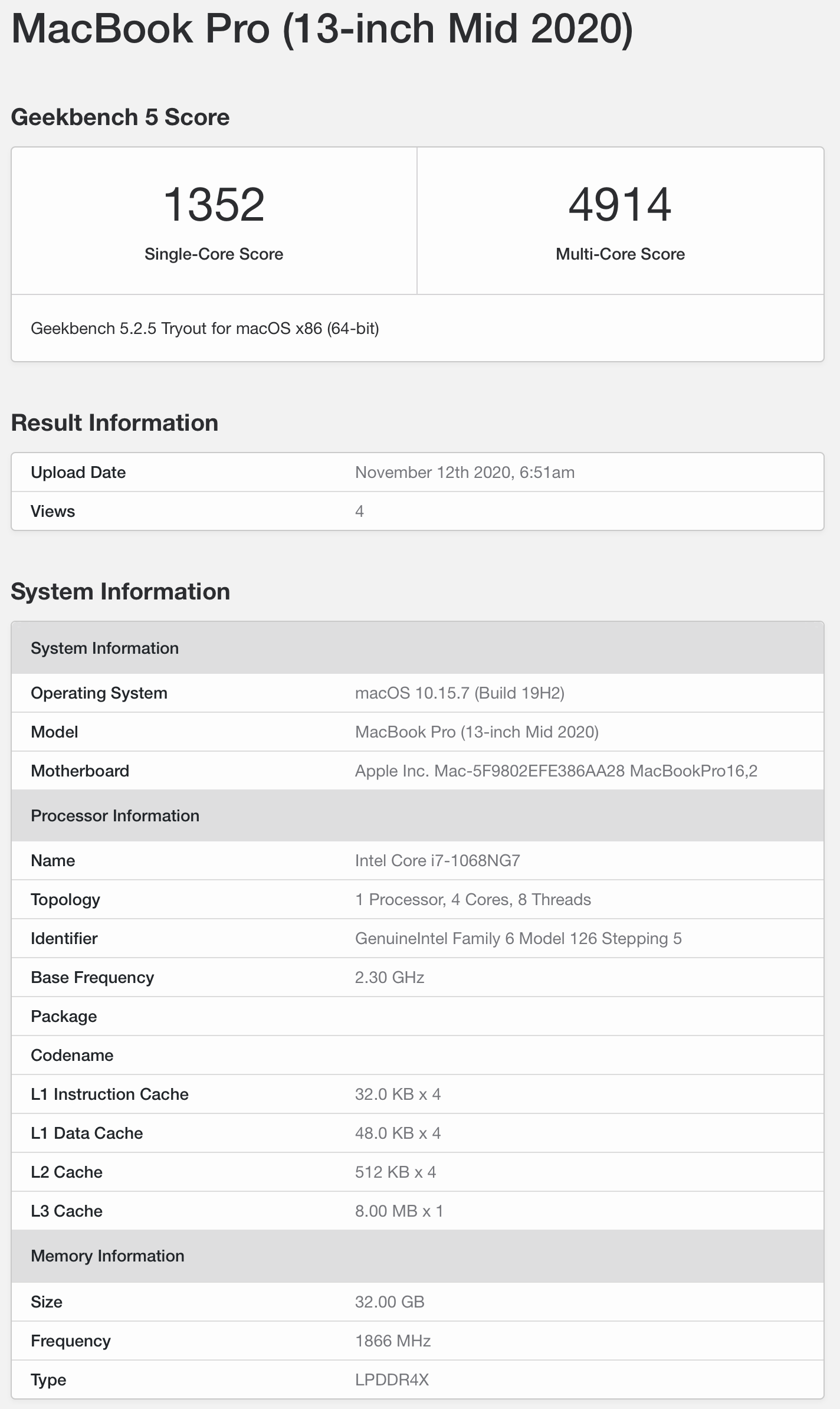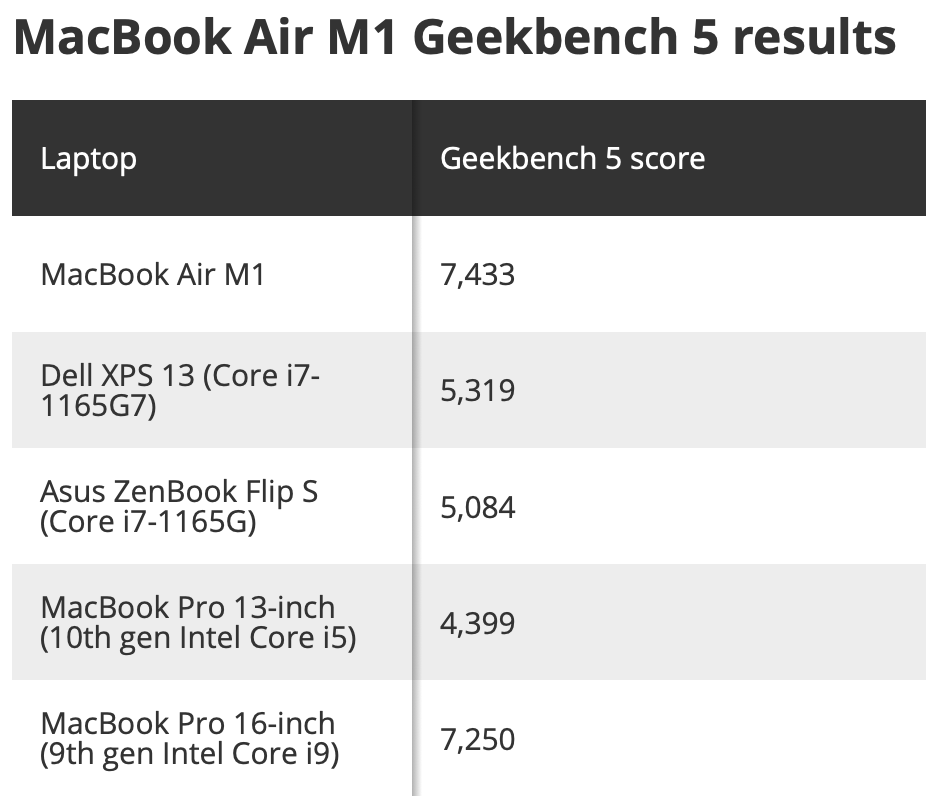Apple’s M1 chip fastest laptop CPU in the world
-
I don't particularly buy into the speculation that the M1 chip limits the amount of RAM or the capacity of the SSD or the # of Thunderbolt/USB ports.
For a completely new chip, you're going to target "regular consumers" rather than power users, professional users, or enterprise users. The professional and enterprise users are more likely to use their computers to do "mission critical" stuff and expect higher reliability. And reliability is something harder to prove with a completely new chip.
So if I am Apple, I'm going to start that new chip with "consumer" systems. For the Mac, that's the MacBook Air, the Mac mini, and the lower-cost 2-port MacBook "Pro." These models had lower limitations to begin with (16GB RAM, 2TB SSD, 2 Thunderbolt/USB ports). Not saying that the M1 has these limitations, but if I decided ahead of time that the M1 will only go into cheaper systems with these limitations, I can turn around and cost-reduce and risk-reduce the M1 to these limitations.
Let the M1 run for a few months in large number of systems in the real customers' hands, see how the reliability numbers shake out, then see if I need to adjust plans to use some revisions of M1 in professional/enterprise systems.
It's a ballsy move to put the new chip in a "fan-less" system (MacBook Air), but that's also a way for them to see just how far they can push the M1's thermal limits in the real world.
I am actually quite tempted to get the MacBook Air.
The software will need more time to catchup, and I am not optimistic about how much performance "Rosetta 2" will suck out of the system emulating an Intel x86 atop the M1, but may be the iOS apps will run great on this (again, not sure how the "touch screen" interface is going to translate to the non-touch screen laptop).
-
I don't particularly buy into the speculation that the M1 chip limits the amount of RAM or the capacity of the SSD or the # of Thunderbolt/USB ports.
For a completely new chip, you're going to target "regular consumers" rather than power users, professional users, or enterprise users. The professional and enterprise users are more likely to use their computers to do "mission critical" stuff and expect higher reliability. And reliability is something harder to prove with a completely new chip.
So if I am Apple, I'm going to start that new chip with "consumer" systems. For the Mac, that's the MacBook Air, the Mac mini, and the lower-cost 2-port MacBook "Pro." These models had lower limitations to begin with (16GB RAM, 2TB SSD, 2 Thunderbolt/USB ports). Not saying that the M1 has these limitations, but if I decided ahead of time that the M1 will only go into cheaper systems with these limitations, I can turn around and cost-reduce and risk-reduce the M1 to these limitations.
Let the M1 run for a few months in large number of systems in the real customers' hands, see how the reliability numbers shake out, then see if I need to adjust plans to use some revisions of M1 in professional/enterprise systems.
It's a ballsy move to put the new chip in a "fan-less" system (MacBook Air), but that's also a way for them to see just how far they can push the M1's thermal limits in the real world.
I am actually quite tempted to get the MacBook Air.
The software will need more time to catchup, and I am not optimistic about how much performance "Rosetta 2" will suck out of the system emulating an Intel x86 atop the M1, but may be the iOS apps will run great on this (again, not sure how the "touch screen" interface is going to translate to the non-touch screen laptop).
@Axtremus said in Apple’s M1 chip fastest laptop CPU in the world:
I am not optimistic about how much performance "Rosetta 2"
I never noticed things being unacceptably slower in Rosetta 1, when the PowerPC - Intel transition occurred. It was totally seamless.
-
Read up some more on Rosetta 2: https://developer.apple.com/documentation/apple_silicon/about_the_rosetta_translation_environment
Will have compatibility issues too, but should hopefully still be a good trade to be able to run iOS apps.
-
Supposedly, you can run iOS apps on the Mac using the M1 chip.
I don't know if this requires some special developer software, or if it's native. If native, that's a big deal.
@George-K said in Apple’s M1 chip fastest laptop CPU in the world:
I don't know if this requires some special developer software, or if it's native. If native, that's a big deal.
Why?
You can already execute iOS code on Intel chips. Just start an iOS virtual machine. Does it matter if it’s a Little faster on the M1?
-
@George-K said in Apple’s M1 chip fastest laptop CPU in the world:
I don't know if this requires some special developer software, or if it's native. If native, that's a big deal.
Why?
You can already execute iOS code on Intel chips. Just start an iOS virtual machine. Does it matter if it’s a Little faster on the M1?
@Klaus said in Apple’s M1 chip fastest laptop CPU in the world:
You can already execute iOS code on Intel chips. Just start an iOS virtual machine
I suppose one could jump through those hoops, but if I could just click on an app that's installed on my phone and run it on my Mac, that would be simple and a big selling points for those who don't know what a "virtual machine" is.
-
I'm about 70% sure that Klaus is a virtual machine.
-
@Klaus said in Apple’s M1 chip fastest laptop CPU in the world:
You can already execute iOS code on Intel chips. Just start an iOS virtual machine
I suppose one could jump through those hoops, but if I could just click on an app that's installed on my phone and run it on my Mac, that would be simple and a big selling points for those who don't know what a "virtual machine" is.
@George-K said in Apple’s M1 chip fastest laptop CPU in the world:
@Klaus said in Apple’s M1 chip fastest laptop CPU in the world:
You can already execute iOS code on Intel chips. Just start an iOS virtual machine
I suppose one could jump through those hoops, but if I could just click on an app that's installed on my phone and run it on my Mac, that would be simple and a big selling points for those who don't know what a "virtual machine" is.
They could very easily make it such that it's just a click on the Mac now. In fact, there's loads of X86 code which those Macs need to execute and the way they execute it is also via some kind of virtualization/emulation/simulation. The main advantage of supporting it directly would be potentially higher speed, but iOS applications usually have fewer resources than what a laptop offers. Overall, I think the main business case for those processors is something else, such as maybe power savings or just good old politics.
-
Note the MacBook Air has only 8GB of RAM
https://browser.geekbench.com/v5/cpu/4648107

Here's the 2020 16-inch MacBook Pro (i7)
https://browser.geekbench.com/v5/cpu/4665711
-
The 2020 Macbook pro uses the Intel Core i7-3720QM - isn't that a really old processor?
-
I don't quite understand why the single core score is so much higher.
The base frequency is a little higher, ok. The caches are significantly bigger, that might make a difference. But I find it hard to imagine that the new chip can do that much more per cycle.
-
-
Yeah, it is impressive. It's not so clear, though, how well that translates into real-world performance. These are all synthetic benchmarks.
One should also add that Intel/AMD desktop/server CPUs are still way faster. The fastest AMD CPUs have a multi-core score of around 60,000.
I personally have always "philosophically" preferred RISC over CISC CPUs. It's nice to see RISC so much on the rise.
-
Yeah, it is impressive. It's not so clear, though, how well that translates into real-world performance. These are all synthetic benchmarks.
One should also add that Intel/AMD desktop/server CPUs are still way faster. The fastest AMD CPUs have a multi-core score of around 60,000.
I personally have always "philosophically" preferred RISC over CISC CPUs. It's nice to see RISC so much on the rise.
@Klaus said in Apple’s M1 chip fastest laptop CPU in the world:
The fastest AMD CPUs have a multi-core score of around 60,000.
I have no doubt that there are many, many, "faster" chips.
The chip is just one part of the equation, see my "Big Sur" thread.
OTOH, that AMD CPU that scores 60K, is that available in a consumer machine for less than $2K?
-
@George-K said in Apple’s M1 chip fastest laptop CPU in the world:
OTOH, that AMD CPU that scores 60K, is that available in a consumer machine for less than $2K?
No, of course not. I merely wanted to point out that this is not "the fastest CPU ever" or something, which somebody may prematurely conclude when looking at the numbers.
-
Yeah, it is impressive. It's not so clear, though, how well that translates into real-world performance. These are all synthetic benchmarks.
One should also add that Intel/AMD desktop/server CPUs are still way faster. The fastest AMD CPUs have a multi-core score of around 60,000.
I personally have always "philosophically" preferred RISC over CISC CPUs. It's nice to see RISC so much on the rise.
@Klaus intel chips are x86 chips (30 year old basic design). They have to dedicate silicon to compatibility with legacy commands, pipelines. Then there are some other features like virtualization which are important for business applications, that benefit from hardware acceleration (but are wasted if you don’t use it).
So in short - intel has a lot of design legacy to deal with and can’t just optimize for today’s common workloads.
-
@George-K said in Apple’s M1 chip fastest laptop CPU in the world:
OTOH, that AMD CPU that scores 60K, is that available in a consumer machine for less than $2K?
No, of course not. I merely wanted to point out that this is not "the fastest CPU ever" or something, which somebody may prematurely conclude when looking at the numbers.
-
@Klaus intel chips are x86 chips (30 year old basic design). They have to dedicate silicon to compatibility with legacy commands, pipelines. Then there are some other features like virtualization which are important for business applications, that benefit from hardware acceleration (but are wasted if you don’t use it).
So in short - intel has a lot of design legacy to deal with and can’t just optimize for today’s common workloads.
@xenon said in Apple’s M1 chip fastest laptop CPU in the world:
So in short - intel has a lot of design legacy to deal with and can’t just optimize for today’s common workloads
I don’t think that this is the main factor. CISC vs RISC, that’s the big difference.
-
@Klaus said in Apple’s M1 chip fastest laptop CPU in the world:
that this is not "the fastest CPU ever"
Fair enough.
Perhaps the "Fastest CONSUMER CPU ever?"

